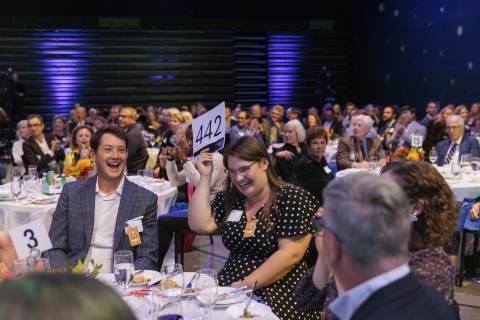David Baker was awarded the 2024 Nobel Prize in chemistry. He celebrated the one-year anniversary of that honor by giving the keynote speech at the annual fundraising event for ARCS Seattle Chapter, aptly called “A Night to Ignite Science.”
Baker is the director of the Institute for Protein Design at the University of Washington and a Howard Hughes Medical Institute (HHMI) investigator. His Nobel honor was for pioneering the design of novel proteins for powerful applications across pharmaceuticals, vaccines, nanomaterials, biosensors, and more.
His lab at the University of Washington has over 100 researchers, including ARCS Scholar Alum Jeremiah Sims, PhD, who is working to complete his MD/PhD.
Sims had the honor of introducing Baker at the ARCS event. He described the day Baker’s Nobel was announced as “truly one of my favorite days in the lab because we celebrated David. He is a crazy connector of people with massive, crazy scientific ideas.”
Baker told the Seattle audience at ARCS Night to Ignite Science that “proteins are these beautiful and strange mysteries of nature. For many years the only proteins we knew were the proteins found in nature. In the past 10 years, we’ve figured out how to design new proteins to solve the problems that are facing humanity today.”
Many researchers in Baker’s lab at UW are designing de novo (from scratch) proteins, leveraging the group’s own RFdiffusion, an AI model that uses a diffusion framework inspired by image generation tools to design new proteins. Baker took time to describe the lab’s work, including the development of a generalized on/off switch for the applications in tunable cancer immunotherapies.
The event raised $1.3 million for the Seattle ARCS chapter to continue supporting students at the University of Washington and Washington State University. The chapter, founded in 1978, currently gives funding to 114 graduate students at UW and 30 at WSU. Each fellowship given is a $22,500 cash award, paid over three years.
“About $900,000 of the funds raised go directly to university-held endowments or will be directed to single-use fellowships; the remainder will be unrestricted, a portion of which will also fund chapter awards,” said Jennifer Gill, the chapter’s Director of Development.
Seattle President Margaret Breen told the event audience that “sharp reductions in research funding threaten opportunities for the very students who will drive tomorrow’s discoveries. Just as ARCS was created in a moment of national urgency, now is the time for us to step forward again.”
Other speakers in Seattle were Tia Hoisington, Jon Oatley, and Scholars presenting research posters for attendees.

